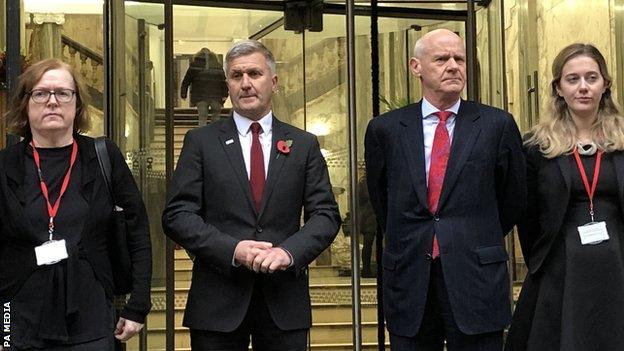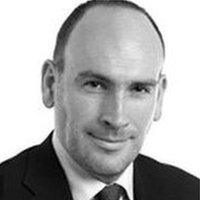Dr Richard Freeman: Guilty verdict and the questions it raises - why this saga is far from over
- Published
Watch BBC sports editor Dan Roan's report on ex-British Cycling doctor found guilty of ordering banned testosterone
Just over four months before the start of the Olympics, British sport has suffered arguably its most serious doping scandal.
Is it really that bad? After all, Richard Freeman is not a household name. He left cycling four years ago. He is a medic, not an athlete. The delivery of testosterone this saga revolves around was made almost a decade ago. Team Sky is gone, taken over by Team Ineos. British Cycling has made reforms, and claims to be a very different organisation since the days when its former doctor had the keys to the national velodrome's medicine storeroom.
But the gravity of the devastating guilty verdict handed down on Friday morning by the panel after a remarkable, two-year long medical tribunal that has done lasting damage to the sport's reputation should not be underestimated.
Consider just how much glory British Cycling enjoyed, on both the road and the track, in the years when Freeman helped some of the country's top riders achieve unprecedented success - 24 medals at the 2012 and 2016 Olympics and six Tour de France victories between 2012 and 2018.
Consider the cloud of suspicion that sadly now taints that golden era, however unfair that may be on the riders who are entirely innocent.
Think about the hundreds of millions of pounds in public money given to a national governing body credited by funding agency UK Sport as a model set-up - £27.6m in the most recent handout, an increase of some 12%, despite no shortage of controversy. And the half a million pounds spent on the much-delayed tribunal, without even taking into account the General Medical Council's (GMC) legal costs.
Reflect on the previous controversies Freeman has been embroiled in; the 'mystery' medical package given to Sir Bradley Wiggins after a race in France in 2011, and the use of the therapeutic use exemption (TUE) system to give the rider banned drugs before major races, both of which the two men have always denied any wrongdoing over.
And then there's the timing. The fact the Testogel was delivered to the velodrome just a year before London 2012.
After a hearing that at times descended into farce, with admissions of an elaborate cover-up, shambolic medical record-keeping, ignorance of basic rules, a destroyed laptop, drugs poured down a sink, claims of erectile dysfunction, stocks of viagra, staff feuds and a furious key witness storming out mid-evidence while Freeman gave evidence behind a screen because of his stress and mental health issues, remember the grim finale - that the former top medic in the sport has been found guilty of a doping offence.
Recall the professionalism and excellence that we were told lay behind cycling's emergence as Team GB's so-called 'medal factory', the driving force behind the country's status as an Olympic and Paralympic super-power at successive Games.
And do not forget the praise and honours heaped on those Freeman worked under at British Cycling and Team Sky: Sir Dave Brailsford, once hailed as a British sporting guru and the architect of the country's cycling revolution, Dr Steve Peters, one of the foremost names in sports medicine, and Brian Cookson OBE, who went on to become the most powerful figure in the sport as president of international cycling federation, the UCI.
There is no suggestion of any wrongdoing by any of them in connection with this, or any other case. But there are still questions to answer.
Not least, which rider was Freeman helping to cheat? Was it just one?
And given the attention to detail and thoroughness that British Cycling and Team Sky were once renowned for, how realistic is it to believe that no-one else knew what Freeman was doing? How credible is it that he was the rogue operator that some in the sport now perhaps conveniently portray him as?

Mary O'Rourke (left) defended Dr Richard Freeman (second left) at the medical tribunal in Manchester
There has already been a call by former shadow sports minister Clive Efford for Brailsford - who now runs Team Ineos - to be suspended, pending an investigation.
Efford is a member of the DCMS select committee, who just three years ago criticised British Cycling's "inexcusable" failure to keep medical records, and accused Team Sky of "crossing the ethical line" in a damning report. It is a reminder that Friday's verdict was just the latest - albeit most damning - scandal to engulf the sport in Britain.
Former Team Sky technical director Shane Sutton - for whom Freeman insisted he acquired the drug, in order to treat a medical condition, something Sutton denied - has told the BBC it is "absolutely ludicrous" that "people are calling for Dave's head", and insisted that neither he nor Brailsford had known anything about the testosterone.
Peters - who was immediately alerted to the delivery of the notorious drug on the day it arrived at the velodrome back in May 2011 - told the tribunal he did not feel the need to tell Brailsford about it, even though it was not until five months later that Freeman provided him with an email appearing to show it had been sent in error.
We now know Freeman was lying about that, of course. He admitted to the cover-up. But many will wonder how an elite sports team that prided itself on leaving nothing to chance acted as it did.
Indeed, if UK Anti-Doping (Ukad) had been alerted to the delivery back in 2011, and had looked into Freeman's claims that it was an innocent mistake, this could perhaps have been cleared up a long time ago.
Brailsford and Peters are yet to comment on the verdict, but Ineos released a statement criticising Freeman, and insisting that it did not believe any rider ever used or sought to use the testosterone. What exactly Ineos believe Freeman did with cycling's doping drug of choice, after having it delivered to the sport's headquarters, remains unclear.
Maybe it would have helped if Brailsford had been asked to give evidence at the tribunal. In her final summing up last month, Freeman's QC Mary O'Rourke described the Team Ineos boss as "the spectre missing at these proceedings".
In the end of course, the GMC did not need to call Brailsford. But now comes the fall-out. Freeman could appeal, as he waits to discover whether he will now be struck off. He could decide to reveal more to the media. And he still faces two Ukad charges.
Almost three years ago, in the only broadcast interview Freeman has given since this saga began, the doctor told me he would "clear everything up" once the case was concluded, but promised there was "no wrongdoing".
After the verdict cycling was dreading, the assurance he gave me now lies in tatters. And sadly for British sport - this saga is still far from over.

Radio 1's Motivate Me Mix: Dermot Kennedy's favourite feel good tracks
Completing an epic challenge: 'My lowest point? When I had to pull out my own teeth'

